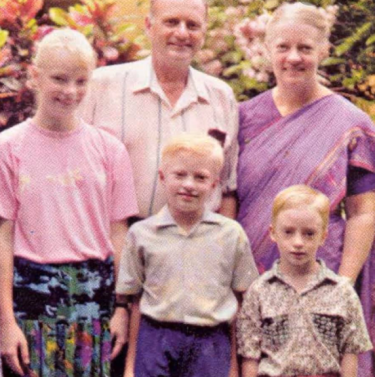
Mahendra Hembram, one of the convicts in the 1999 murder of Australian missionary Graham Staines and his two minor sons, walked free from Keonjhar jail in Odisha on Wednesday, April 16, after serving 25 years behind bars. Prison authorities cited “good behaviour” as the grounds for his release.
Hembram, now 50, was garlanded by jail officials as a mark of recognition for his good conduct during his incarceration. Outside the prison, his supporters reportedly raised slogans of “Jai Shri Ram” as he emerged a free man.
“Hembram has been released following a decision by the State Sentence Review Board. The prison directorate informed about it in a letter on Tuesday. He has been released after 25 years because of good behaviour in accordance with the rules,” said Jailer Manaswini Naik.
The release was part of a broader government initiative that saw 30 other murder convicts freed from various prisons across the state on the same day, based on the government’s premature release policy for prisoners who have served between 14 to 25 years in separate murder cases.
Upon his release, Hembram maintained his innocence, telling reporters, “I spent 25 years in jail after being falsely implicated in an incident related to religious conversion. Today, I have been released.” He also received a bank passbook containing his earnings from prison labour accumulated during his incarceration.
The Heinous Crime
Hembram was convicted along with Rabindra Pal Singh, also known as Dara Singh, for the brutal murders that shocked the conscience of humanity worldwide. On the night of January 21, 1999, Staines, 58, and his sons Philip (10) and Timothy (6) were burned alive while sleeping in a station wagon parked outside a church in Manoharpur village in Keonjhar district.
According to police accounts, the mob allegedly led by Dara Singh and Hembram attacked the sleeping family, setting fire to the vehicle after pouring kerosene on it. When the victims tried to escape, the mob - armed with lathis - prevented them from getting out, leading to their deaths.
“Accusing Staines of promoting conversion, Hembram allegedly assaulted him and his two children. The mob was being led by Dara and Hembram, who were raising slogans against Staines. Staines was pleading mercy,” said a retired police officer who was posted in Keonjhar on the night of the incident.
Legal Journey
The case saw a total of 51 people arrested between 1999 and 2000. Hembram was arrested on December 9, 1999, while Dara Singh was apprehended on January 31, 2000.
The trial began on March 1, 2001, at the District and Sessions Court in Khurda, designated as a Central Bureau of Investigation (CBI) court. During the trial in February 2002, Hembram reportedly lost mental composure and declared himself the sole culprit, claiming that others were innocent.
On September 22, 2003, the CBI court awarded Dara Singh the death penalty and sentenced 12 others, including Hembram, to life imprisonment, while 37 were acquitted within three years of the incident. In 2005, the Orissa High Court reduced Singh’s sentence to life imprisonment and acquitted 11 others, retaining the conviction only for Singh and Hembram.
Mixed Reactions
Hembram’s release has generated mixed reactions. The Vishwa Hindu Parishad (VHP) welcomed the decision, with its joint secretary, advocate Kedar Dash, stating, “It is a good day for us. We welcome the government’s decision.”
However, opposition Congress lawmaker Manickam Tagore questioned the release, writing on social media platform X: “A hate-fuelled murderer who burned alive Graham Staines and his two little sons is now walking free. Mahendra Hembram’s release is a celebration for Sanghis, but a dark stain on Indian justice. What message does this send?”
Focus Shifts to Dara Singh
With Hembram now free, attention has shifted to Dara Singh, who remains imprisoned. On March 19, 2025, the Supreme Court directed the Odisha government to decide within six weeks on Singh’s remission plea.
Singh’s lawyer, Vishnu Shankar Jain, has argued for his release citing the Supreme Court’s order for the release of Rajiv Gandhi assassination case convict A.G. Perarivalan after spending over 30 years in jail. “I am seeking a direction [for Singh] to be released from jail on this ground,” Jain stated.
It’s worth noting that a campaign for Singh’s release had earlier received support from Mohan Majhi, now the Chief Minister of Odisha, during his tenure as the Keonjhar MLA.
According to the 2022 government guidelines, life convicts must serve a minimum of 14 years before being considered for remission, with serious murder cases requiring 20 to 25 years of imprisonment. Age-based considerations exist for female convicts above 60 and male convicts above 65.




